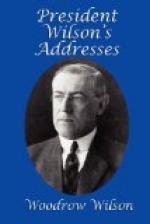So I want to utter my earnest protest against any manifestation of the spirit of lawlessness anywhere or in any cause. Why, gentlemen, look what it means. We claim to be the greatest democratic people in the world, and democracy means first of all that we can govern ourselves. If our men have not self-control, then they are not capable of that great thing which we call democratic government. A man who takes the law into his own hands is not the right man to cooeperate in any formation or development of law and institutions, and some of the processes by which the struggle between capital and labor is carried on are processes that come very near to taking the law into your own hands. I do not mean for a moment to compare them with what I have just been speaking of, but I want you to see that they are mere gradations in this manifestation of the unwillingness to cooeperate, and that the fundamental lesson of the whole situation is that we must not only take common counsel, but that we must yield to and obey common counsel. Not all of the instrumentalities for this are at hand. I am hopeful that in the very near future new instrumentalities may be organized by which we can see to it that various things that are now going on ought not to go on. There are various processes of the dilution of labor and the unnecessary substitution of labor and the bidding in distant markets and unfairly upsetting the whole competition of labor which ought not to go on. I mean now on the part of employers, and we must interject some instrumentality of cooeperation by which the fair thing will be done all around. I am hopeful that some such instrumentalities may be devised, but whether they are or not, we must use those that we have and upon every occasion where it is necessary have such an instrumentality originated upon that occasion.
So, my fellow-citizens, the reason I came away from Washington is that I sometimes get lonely down there. So many people come to Washington who know things that are not so, and so few people who know anything about what the people of the United States are thinking about. I have to come away and get reminded of the rest of the country. I have to come away and talk to men who are up against the real thing, and say to them, “I am with you if you are with me.” And the only test of being with me is not to think about me personally at all, but merely to think of me as the expression for the time being of the power and dignity and hope of the United States.
THE CALL FOR WAR WITH AUSTRIA-HUNGARY
[Address delivered at a joint session of the two Houses of Congress, December 4, 1917.]
GENTLEMEN OF THE CONGRESS:
Eight months have elapsed since I last had the honor of addressing you. They have been months crowded with events of immense and grave significance for us. I shall not undertake to retail or even to summarize those events. The practical particulars of the part we have played in them will be laid before you in the reports of the Executive Departments. I shall discuss only our present outlook upon these vast affairs, our present duties, and the immediate means of accomplishing the objects we shall hold always in view.




